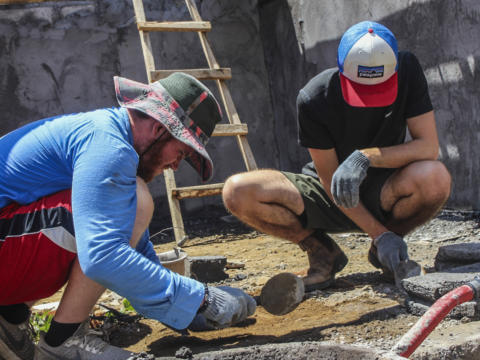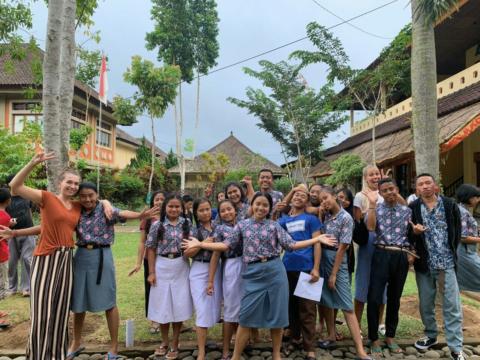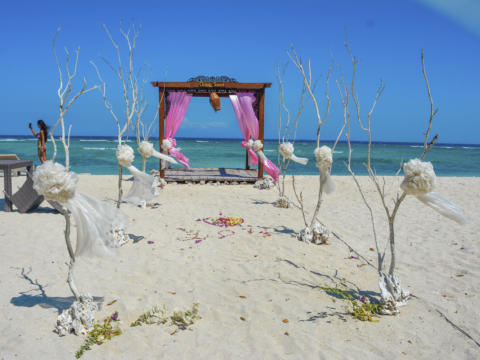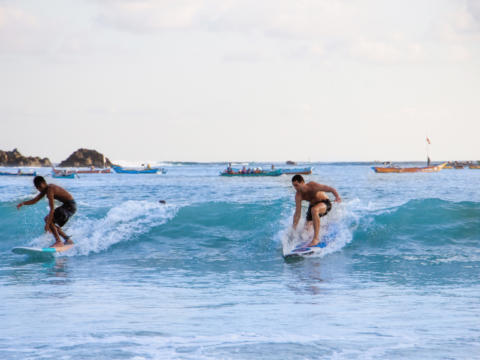Only 270€ per week!
Environmental Education Program
Pejeng (Ubud) - Indonesia
Environmental Education Program
Pejeng (Ubud) - Indonesia
For anyone with an interest in environmental issues, with these deep, historical and ongoing cultural ties, this project will offer the best opportunity.
Becoming involved with the local population who regard their environment, not as a separate entity, but very much as a part of their daily lives, makes this project very much a partnership with an equal objective.
Program Description
Bali is well known for its astonishing beauty and greenery. Unfortunately, due to rapid development and the rise in tourism, the local surroundings of Bali have experienced many negative consequences. Plastic water bottles and plastic food wrappers are of great concern and you will often see people simply throwing these on the ground, as food in Bali were traditionally wrapped in biodegradable banana leaves. The relationship between humans and the environment is an important part of the Balinese culture and the aim of this project is to instil environmental education in the children at a young age, imparting your message in a fun and dynamic manner. The emphasis is on “hands-on” techniques – getting the children out and about in nature and working together. Participants spend two hours each morning planning their campaign and go to schools in the Ubud area in the afternoon.
Our environmental education program focuses on primary schools in Bali. Whilst education is the starting point, we encourage students to work together and do their part, emphasizing that every little effort counts.
The relationship between humans and the environment is an intrinsic part of the Balinese culture and the Balinese are known to respect and treat their environment well long before it became fashionable in the West. One example of this is the Tumpek Uduh day which is a ceremony conducted across Bali for large trees especially fruit bearers and the coconut palm in particular. This is done in order to:
- show gratitude to the trees for their usefulness to humans and the environment.
- recognize their importance to the livelihood of the Balinese.
- pray for continuance in the central role they play in providing a balance between both humans and their environment.
The teaching plan will be confirmed again every Friday.
Aims & Objectives
To teach the future generation of the country to look after nature through meaningful and joyful educational activities and “hands on” techniques.
Schedule
Monday
On Monday which would be the first day of your project, you will have your breakfast and prepare for the activities that you expect to do with the children. These preparations would include numerous ways and activities through which you expect to educate the children on protecting the environment. After having lunch, you will then leave to the local school where you can commence the activities you have prepared for the day. Upon your arrival from the school after the activities, you can then share your experiences and feedback regarding the program with us. You would end your day by having a delicious dinner at the Center.
Tuesday to Friday
From Tuesday to Friday, you will start your day with breakfast and then designing the activities to be carried out each day. Once you decide on the activities which you will have to carry out on a respective day, you can leave to the school after having lunch. At the school, you will engage with the enthusiastic kids in carrying out the activities you prepared. Once you complete the activities of the day, you can then return to the Center to relax.
Note: This schedule can be changed and/or amended depending on weather conditions, local conditions and unforeseen circumstances.
Participant Criteria & Requirements
Standard Requirements
Minimum age: –
Maximum age: –
Minimum English level: Basic
CRB required: On Signup
Passport copy required: On Signup
Resume copy required: No
Required qualification: None
Additional Requirements
Participants below 18 are required to provide parental consent letters and participants above 65 should have the medical clearance.
Additional Equipment
No specific equipment required for this program.
Location
You will be accommodated in one of our houses in the village of Pejeng Kaja. Located on the outskirts of Ubud, village life is quintessentially local here and you will get a good chance to see typical Balinese life – roosters crowing and all!
About the Accommodation
The accommodation is located in Pejeng Kaja which has shared rooms for participants including all facilities as well as enough space for them to interact and enjoy their time in Bali. There are two centers in Pejeng which are specially furnished for the participants’ accommodation namely Santi Rahayu and Melati.
Food Arrangements
Indonesian food is tasty and diverse and you can expect to experience a myriad of flavours and meals during your stay. Typical dishes included Mie Goreng (fried noodles and vegetables), Nasi Goreng (fried rice and vegetables) or Gado Gado (mixed vegetables with a satay sauce). For those who do not eat meat, Indonesian cooking uses a lot of tofu and tempeh (soybeans), some western dishes would also be available. Breakfasts are varied and include pancakes, fresh fruit, toast etc. Tea, coffee and purified water are available at the house. We do not recommend drinking tap water.
Facilities
Our houses are located in Pejeng village and it will take about 15-30 minutes by car to reach the center of Ubud depending on the traffic.
There are grocery shops in the village and 24 hours mini-marts are available in Ubud center.
Shopping
There are small local shops which will take 5-10 minutes by a walk where you will be able to find everything that you need.
Restaurants and Cafes
If you want to eat out occasionally, there is a wide selection of restaurants with high standards of both international and local cuisine. There are several cafes in the village, where you can relax and hang out with other participants in your spare time. It takes about 5 minutes by car or 20 minutes by walk to the center of the village.
Swimming Pools
Our swimming pool can be reached in 10 minutes by walk and is available for all the participants. There is a juice bar at the swimming pool where you can buy meals, snacks and drinks.
Gym
There are several gyms around Ubud area.
Clinic and Hospital
The clinic UPT Kesmas is open 24 hours, is located in Tampaksiring about 4 km away. It takes about 10 minutes by car and the hospital Ari Canti hospital Rumah Sakit is about 8 km from the center and it takes 15 minutes by car to reach there.
Activities & Events
No scheduled activities outside the program.
Sights & Surroundings
Since the weekends are free, you can go wherever you please. Several popular destinations that you can reach by taxi are:
The Gili Islands, where you will find small resorts and huts for tourists looking to get away from the bustle of Ubud. The islands are a popular destination for snorkelling and diving due to their abundant marine life.
Nusa Lembongan, an island paradise with one of the clearest waters that you will ever see and it is also a place where you can find peace and completely relax. Surfing, diving and snorkelling are amongst the most popular activities that visitors can enjoy.
Lovina, located between the Bedugul mountains and the sea, it is popular for dolphin watching, trekking, hot springs and its gorgeous coral reefs.
Sanur, a stretch of beach in Southeast Bali that contains villa resorts and Zen Villas. Historically, it was used as the landing site for the Dutch invasion troops during the Dutch invasion in 1906 as well as being the entry point into Bali for the Japanese during WWII.
Kuta, a beach known for its surfing opportunities and party atmosphere.
Uluwatu, a temple built at the edge of a 70-meter high cliff at the edge of the sea and inhabited by monkeys.
Transportation
From this location we do not provide free transport to other locations.
Quick Facts
Name: Republic of Indonesia
Population: 255,461,700 (2015)
Capital: Jakarta
Language: Indonesian (official)
Currency: Indonesian rupiah (IDR)
Time zone: UTC +8
Country Information
Indonesia, a Southeast Asian nation made up of thousands of volcanic islands, is home to hundreds of ethnic groups speaking many different languages. It is known for its beaches, volcanoes and jungles sheltering elephants, tigers and Komodo dragons. On the island of Java lies Indonesia's vibrant, sprawling capital, Jakarta, and the city of Yogyakarta, known for gamelan music and traditional puppetry.
Bali
Dubbed the Island of the Gods, Bali is one of the more than 17,000 islands that make up the Indonesian archipelago. Due to its location off the coast from the mainland and unique culture and religion from the rest of the country, Bali is often treated as a destination of its own, “if you’ve only been to Bali, you’ve never been to Indonesia”.
With its pristine beaches, its unspoilt waters ideal for surfing and diving, its lush mountains, its never-ending rice terrace and volcanic hillsides, its spiritually-infused culture and more, Bali has quickly become a must-visit and it often makes its way on everyone’s bucket list.
Flores
Flores is located in the East Nusa Tenggara province of Indonesia. It has adventure, eco-tours, and mountain climbing interspersed with visits to prehistoric heritage sites, traditional villages and cultural events. It has some of the world’s most exotic marine life. And if you want to see the famous Komodo Dragons alive, this is the only place in the whole world which gives you the experience. You can visit the Komodo dragons in their natural habitats in the Komodo National Park islands. Here you will witness the natural treasures still trying to survive in their purest forms.
Flores is a multi-religious and multi-cultural island where 60% of the people are Christian, 20% Islamic and 20% Hindus and Buddhists. The holidays for Flores are similar to the general Indonesian calendar.
Flores, though one of the main islands in Indonesia, is still trying to keep up with the rest of the country. Evidently, its exceptional natural treasures need more care and its warm hearted people need more support.
Climate
Temperatures are pleasant, varying from 20-33 degrees celsius year-round. The monsoon season strikes in November and makes its way until March, bringing in humidity and a significant amount of rain. However, this usually does not stop people from visiting, as the rain usually begins in the late afternoons and evenings, meaning the daytime remains sun-filled. From June to September, the weather is dry and there is not too much humidity in the air.
Culture
Indonesia is a haven for customs and this can be seen in every corner of the islands. Not to mention the fact that these islands themselves have their own traditions and customs which are different from one another.
A good example of this can be experienced in Bali, where small offerings containing flowers, rice and even cigarettes (sesajen) are found in every house, restaurants, stalls and even at the check-in desks at airports. The offerings are set with burning incense sticks and sprinkled with holy water three times a day before every meal.
There are roughly 20,000 temples spread around the island of Bali and, because the Balinese are masters of sculpture, the temples are guarded with statues of gods and goddesses.
Keep, in mind, however, that the Hinduism you will see in Bali is often different than the one seen in India.
Transportation
By bus
Perama buses are the most famous company that will transport you around Bali and other parts of Indonesia. Another popular company is Trans Sarbagita, which are comfortable and air conditioned and stop on bus stops on road curbs. We highly recommend booking at least one day in advance to make sure there is a seat for you. Moreover, there are shuttle buses (called “Bemos”) between Bali’s most popular destinations.
By Taxi
Taxis are a common way to get around. Blue Bird/Bali Taksi are regarded as one of the most reliable companies. Taxis are metered and the drivers are often able to speak good enough English to understand you. They also have a waiting service, which means they will wait for you while you go sightseeing and take you back home (for an extra charge, of course), if you wish to.





